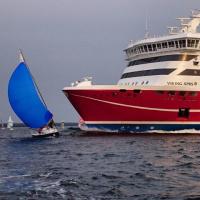
The 1972 Convention was designed to update and replace the Collision Regulations of 1960 which were adopted at the same time as the 1960 SOLAS Convention.
One of the most important innovations in the 1972 COLREGs was the recognition given to traffic separation schemes - Rule 10 gives guidance in determining safe speed, the risk of collision and the conduct of vessels operating in or near traffic separation schemes.
The first such traffic separation scheme was established in the Dover Strait in 1967. It was operated on a voluntary basis at first but in 1971 the IMO Assembly adopted a resolution stating that that observance of all traffic separation schemes be made mandatory - and the COLREGs make this obligation clear.
The COLREGs include 38 rules divided into five sections: Part A - General; Part B - Steering and Sailing; Part C - Lights and Shapes; Part D - Sound and Light signals; and Part E - Exemptions. There are also four Annexes containing technical requirements concerning lights and shapes and their positioning; sound signalling appliances; additional signals for fishing vessels when operating in close proximity, and international distress signals.
Although rules for navigating vessels inland may differ, the international rules specify that they should be as closely in line with the international rules as possible. In most of continental Europe, the Code Européen des Voies de la Navigation Intérieure (CEVNI, or the European Code for Navigation on Inland Waters) apply. In the United States, the rules for vessels navigating inland are published alongside the international rules.
The Racing Rules of Sailing, which govern the conduct of yacht and dinghy racing under the sanction of national sailing authorities which are members of the International Sailing Federation (ISAF), are based on the COLREGs, but differ in some important matters such as overtaking and right of way close to turning marks in competitive sailing.
By IMO, Wikipedia and Crewing24.com
![[ad-side]](http://www.crewing24.com/ad_images/48_banner.jpg)
![[ad-side]](http://www.crewing24.com/ad_images/79_banner.jpg)
![[ad-side]](http://www.crewing24.com/ad_images/94_banner.png)
![[ad-side]](http://www.crewing24.com/ad_images/106_banner.jpg)
![[ad-side]](http://www.crewing24.com/ad_images/65_banner.jpg)
![[ad-side]](http://www.crewing24.com/ad_images/85_banner.jpg)
![[ad-side]](http://www.crewing24.com/ad_images/80_banner.jpg)
![[ad-side]](http://www.crewing24.com/ad_images/93_banner.jpg)
![[ad-side]](http://www.crewing24.com/ad_images/105_banner.jpg)
![[ad-side]](http://www.crewing24.com/ad_images/110_banner.png)